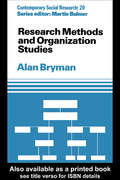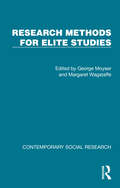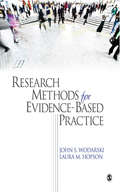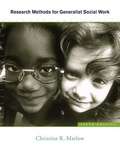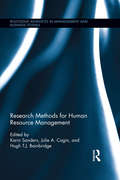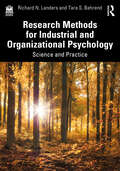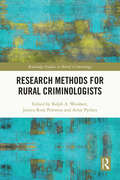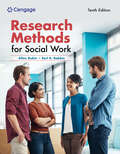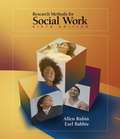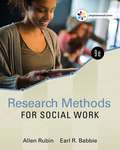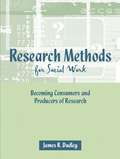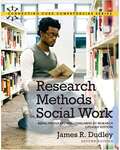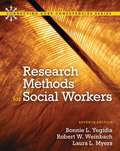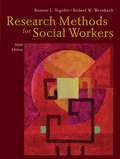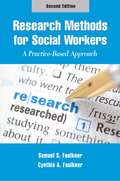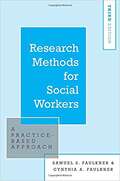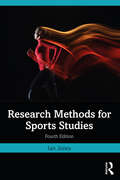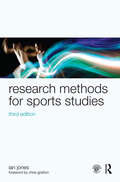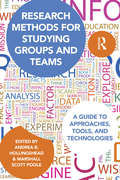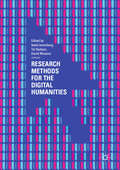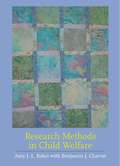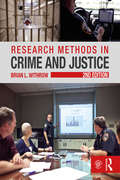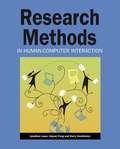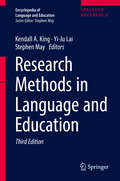- Table View
- List View
Research Methods and Organization Studies
by Alan BrymanFirst published in 2004. Routledge is an imprint of Taylor & Francis, an informa company.
Research Methods for Elite Studies (Contemporary Social Research)
by George Moyser Margaret WagstaffeElites are crucial groups of people in all but the very simplest societies. Whether one is concerned with politics and government, the economy, or the wider culture and structure of society, they are the people who occupy the central positions of influence that, in turn, enable them to help shape the character and direction of the whole society.But who exactly are they, and how does one study them? In sharp contrast to the ordinary citizenry, the methodology for the study of elites was contentious and under-developed at the time. Originally published in 1987, Research Methods for Elite Studies provided a wide-ranging survey of the techniques, problems, issues and practicalities of elite research. These are explored through case studies conducted by a range of experts, all personally involved in the field of elite research about which they write. Methodology here is not divorced from substance, but vividly set in its context by the researchers.Research Methods for Elite Studies is directed to all social scientists who seek to understand the working of the powerful in society. In particular, those concerned with political power, with the functioning of social and political institutions, with economic enterprises, and above all with the diverse variety of leaders in society, will find the volume essential reading.
Research Methods for Evidence-Based Practice
by John S. Wodarski Laura HopsonThis practical and student-friendly text teaches social work students the concepts and skills needed to apply research methods in their practice with clients. It offers students an enhanced understanding of the research process, and equips them with the necessary tools and skills to evaluate studies, translate relevant behavioral science knowledge into practice principles, and implement evaluation procedures in their daily practice. Renowned authors Wodarski and Hopson use social work research methods to examine emerging issues in the field as they pertain to evidence-based practice, such as curriculum development and funding. This approach yields a unique analysis that differs from others on the market because it fully integrates evidence-based practice methodology into the heart of the text, rather than in a single chapter.
Research Methods for Generalist Social Work (Fifth Edition)
by Christine R. MarlowRESEARCH METHODS FOR GENERALIST SOCIAL WORK provides a clear, down-to-earth introduction to the concepts of research methodology. Marlow's accessible research methods text consistently demonstrates the link between social work research and generalist social work practice, making the methodology easy to grasp. The text helps you discover the relevance of research to social work practitioners.
Research Methods for Human Resource Management: Research Methods For Human Resource Management (Routledge Advances in Management and Business Studies)
by Karin Sanders Julie A. Cogin Hugh T.J. BainbridgeSince the beginning of the century, there have been calls for the integration of traditional individualistic (micro) and management (macro) paradigms in Human Resource Management studies. In order to understand this so-called ’black box,’ the HR field needs research which is more sensitive to institutional and cultural contexts, focusing on formal and informal relationships between employees, supervisors and HR managers and the means by which these organizational participants enable and motivate one another. This book presents advanced quantitative and mixed research methods that can be used to analyze integrated macro and micro paradigms within the field of Human Resource Management. Multi actor, social network and longitudinal research practices, among others, are explored. Readers will gain insight into the advantages and disadvantages of different research methods in order to evaluate which type is most suitable to their research. This book is suitable for both advanced researchers and graduate students.
Research Methods for Industrial and Organizational Psychology: Science and Practice
by Richard N. Landers Tara S. BehrendThis important and useful book offers a clear and comprehensive foundation for research methods in industrial and organizational (I-O) psychology. The text provides readers with a key understanding of the research, theory, and practice needed towards becoming a research methods expert.The use of trustworthy and rigorous research methods is foundational to advancing the science of industrial and organizational psychology and its practice in the field. Understanding this, the authors have paired straightforward, plainly written explanations in a conversational tone with illuminating diagrams and illustrations. Many descriptions are followed by in-depth demonstrations and examples from relevant software, including SPSS, R, and even Excel when it’s the best option available. Insightful and accessible, the text covers the full gamut of I-O research methods, from theory to practice and everywhere between.Paired with a detailed instructor’s manual, this book serves as a gentle but thorough introduction to the complex world of research methods in I-O psychology for both master’s and Ph.D. students, as well as researchers, academics, and practitioners.
Research Methods for Rural Criminologists (Routledge Studies in Rural Criminology)
by Ralph A. WeisheitConducting rural criminological research exposes researchers to concerns such as absence or inadequate official data about crime and superficial rural-urban comparisons, rural isolation and distance from the researchers’ office to the study site, and lack of services or access to justice. This distinct cultural context means that studying rural crime requires creatively adapting existing research methods. Conducting research about or in rural settings requires unique researcher preparation, as everything from defining the space at the conception of a project to collecting and analyzing data differs from urban research. This book explores the various issues, challenges, and solutions for rural researchers in criminology. Integrating state of the art methodological approaches with practical illustrations, this book serves as an internationally comprehensive compendium of methods for students, scholars, and practitioners. While contributing to the growing field of rural criminology, it will also be of interest to those engaged with the related areas of rural health care, rural social work, and rural poverty.
Research Methods for Social Work
by Allen Rubin Earl R. BabbieIf you're intimidated by the thought of taking research methods, Rubin/Babbie's RESEARCH METHODS FOR SOCIAL WORK, 10th Edition, can help you overcome the fear associated with this course with its reader-friendly presentation of all aspects of the research endeavor. Students will appreciate the authors' clear and humorous writing style as well as the depth and breadth of coverage of current issues regarding social and racial justice. The text strikes a balance of quantitative and qualitative research techniques, illustrating how the two methods complement one another and can be integrated in the same study. Real-world examples highlight connections between research, social work practice and social justice. Comprehensive, friendly, accurate and integrating the best of technology, the text is widely considered the best for the research methods course -- and when you read it, you'll see why.
Research Methods for Social Work (6th edition)
by Allen Rubin Earl R. BabbieRubin (social work, U. of Texas at Austin) and Babbie (Chapman U.) have increased their coverage of evidence-based practice and reorganized materials to more closely reflect current typical procedures in this practical guide to gathering and analyzing data. They approach social work research as a science but also thoroughly describe the human side, including the ethics and politics of social work research and culturally competent research. Step by step they show such processes as formulating problems, determining measurements, choosing designs for evaluating programs and practice, collecting large sources of data, using qualitative research methods, analyzing quantitative data, and writing research proposals and reports. They include very helpful appendices on using the library, statistically estimating sampling error, and using SPSS 11.0 for Windows.
Research Methods for Social Work (Empowerment)
by Allen Rubin Earl R. BabbieWidely considered the best text for the course, RESEARCH METHODS FOR SOCIAL WORK, Seventh Edition strikes an optimal balance of quantitative and qualitative research techniques--illustrating how the two methods complement one another. Allen Rubin and Earl R. Babbie’s classic bestseller is acclaimed for its depth and breadth of coverage as well as the authors’ clear and often humorous writing style. Combining a rigorous and comprehensive presentation of all aspects of the research endeavor with a thoroughly reader-friendly approach helps students overcome the fear-factor often associated with this course. Relevant examples from real-world settings consistently help students see the connections between research and social work practice. In response to the move toward teaching evidence-based practice throughout the curriculum, the new edition also enhances coverage of evidence-based practice as well as keeps the text in line with other accreditation requirements based on the recently revised EPAS guidelines. Comprehensive, friendly, accurate, and integrating the best of technology, RESEARCH METHODS FOR SOCIAL WORK, 7e is an excellent text that can be used across undergraduate, graduate, and doctorate levels of study.
Research Methods for Social Work: Becoming Consumers and Producers of Research
by James R. DudleyResearch Methods for Social Work, 1e, is easy to read and understand yet fully covers all of the Council of Social Work Education accreditation standards. This is the perfect introduction to research methods for beginning social work students as well as instructors or professionals who do not usually conduct research. The topic of research is presented through the use of concepts that are relevant to Social Work practice as well as interesting and enjoyable to the reader. The role of critical consumer skills and technology in the practice of social work is stressed throughout. Illustrations, charts, graphs, and case vignettes are used in each chapter to reinforce concepts and enhance understanding.
Research Methods for Social Work: Being Producers and Consumers of Research (Connecting Core Competencies)
by James DudleyWith its practical and accessible writing style, Research Methods for Social Workers, second edition, offers numerous examples from the field of social work and emphasizes how research and social work practice are connected. CSWE-mandated areas of social work are emphasized. <p><p> With over 25 years of teaching research and social work practice course, the author understands first-hand how practice and research are connected and how vital they are to each other. <p><p> Each chapter reflects and integrates the core competencies in the 2008 Educational Policy and Accreditation Standards (EPAS) set by the Council on Social Work Education (CSWE). End-of-chapter assessment reinforces this integration, and MySocialWorkLab.com activities support the mastery of CSWE's core competencies.
Research Methods for Social Workers
by Bonnie L. Yegidis Robert W. Weinbach Laura L. MyersThis social work research methods text is written in an accessible, reader-friendly style and includes numerous examples of how research can be used to inform social work practice. It is part of the Connecting Core Competencies Series that integrates CSWE's core competencies and practice behaviors throughout.
Research Methods for Social Workers (6th edition)
by Bonnie L. Yegidis Robert W. WeinbachDesigned for a one-semester or one-quarter course on research methods, this text for undergraduate or beginning graduate students in social work prepares students to become critical consumers of research literature and to design and implement research. Part I places current research in historical context, and Part II centers on pre-data collection tasks. Part III looks at how questions are answered and how hypotheses are tested, and Part IV examines methods for evaluating practice effectiveness. Examples refer everyday social work situations. Yegidis is affiliated with the University of Georgia. Weinbach is affiliated with the University of South Carolina. Annotation c. Book News, Inc. , Portland, OR (booknews. com)
Research Methods for Social Workers: A Practice Based Approach (Second Edition)
by Samuel S. Faulkner Cynthia A. FaulknerSamuel and Cynthia Faulkner have developed the perfect research methods text tailored specifically for social work students that illustrates how understanding research is valuable for success in evidence-based agency practice. From the basics of research to practice evaluation, the authors carefully guide students through the complete process. They are able to connect abstract theory with practical applications, providing the skills necessary to become effective practitioners. The book introduces complex concepts such as qualitative, quantitative, and statistical methods; ethical issues in research; sampling; and measurement in a manner that students find readily accessible. What is most impressive about this new edition is that there is an additional 30% of new or updated material. Developed in part from suggestions made by students and faculty who have used the previous edition, these improvements include content and instructional features that will remind you why this is one of the best research methods books on the market! Features: NEW CSWE Core Competencies at the beginning of each chapter. NEW Practice exam at the end of each chapter. NEW! Case scenarios in each chapter demonstrating practical use of material along with associated critical thinking questions. NEW! Survey research chapter illustrating how to develop and conduct survey instruments. NEW! Example research proposal and example research report demonstrating how research is effectively gathered, processed, and presented. NEW! Examples throughout the text relating to social work practice.
Research Methods for Social Workers: A Practice-Based Approach
by Samuel S. Faulkner Cynthia A. FaulknerFrom the outset, the ultimate goal of Research Methods for Social Workers has been to serve as a research text that students would be able to understand and read in full. This third edition features important additions and changes to the original text (while maintaining its accessible style). <p><p> The order of chapters is re-arranged to improve the flow of introducing and developing concepts of the research process, and the authors have included some much-needed information to meet the changing and evolving standards of social work education. At its core, this book is designed to bring complex ideas down to a level that can be grasped by someone with little to no knowledge of research methods - it is an invaluable resource for social work students and anyone who wishes to have a comprehensive introduction to research methods.
Research Methods for Sports Studies
by Ian JonesResearch Methods for Sports Studies is a comprehensive, engaging and practical textbook that provides a grounding in qualitative and quantitative research for students studying programmes related to sport and physical activity. Leading the reader step-by-step through the entire research process, from identifying a research question and collecting and analysing data to writing and presenting the research report, the book is richly illustrated throughout with sport-related case studies and examples from around the world. Research Methods for Sports Studies is designed to be a complete and self-contained companion to any research methods course and contains a wealth of useful features, such as highlighted definitions of key terms, all-new case studies from active researchers and practical research exercises. Now in a revised and updated fourth edition, and in full colour for the first time, the book features expanded coverage of key topics such as online research, data visualisation, image analysis, source evaluation, mixed methods and the philosophical foundations of research. It also includes new material on the challenges of researching during a pandemic and reflects on the importance of diversity and inclusion, from feminist and indigenous methodologies to increased diversity of cases and researcher voices. This is an essential read for any student undertaking a dissertation or research project as part of their studies in sport, exercise and related fields, including sport management, sport development, the sociology of sport, sport marketing, sport-related tourism, sport coaching, physical education and other similar degrees. Additional online material is available for students and instructors, including web links, multiple-choice revision questions, PowerPoint slides and additional learning activities for use in and out of class.
Research Methods for Sports Studies: Third Edition
by Ian JonesResearch Methods for Sports Studies is a comprehensive, engaging and practical textbook that provides a complete grounding in both qualitative and quantitative research methods for the sports studies student. Leading the reader step-by-step through the entire research process, from identifying a research question and collecting and analyzing data to writing the research report, it is richly illustrated throughout with sport-related case-studies and examples from around the world. Now in a fully revised, updated and expanded third edition, the book includes completely new chapters on using social media and conducting on-line research, as well as expanded coverage of key topics such as conducting a literature review, making the most of statistics, research ethics and presenting research. Research Methods for Sports Studies is designed to be a complete and self-contained companion to any research methods course and contains a wealth of useful features, such as highlighted definitions of key terms, revision questions and practical research exercises. An expanded companion website offers additional material for students and instructors, including web links, multiple choice revision questions, an interactive glossary, PowerPoint slides and additional learning activities for use in and out of class. This is an essential read for any student undertaking a dissertation or research project as part of their studies in sport, exercise and related fields.
Research Methods for Studying Groups and Teams: A Guide to Approaches, Tools, and Technologies (Routledge Communication Series)
by Marshall Scott Poole Andrea B. HollingsheadThis volume provides an overview of the methodological issues and challenges inherent in the study of small groups from the perspective of seasoned researchers in communication, psychology and other fields in the behavioral and social sciences. It summarizes the current state of group methods in a format that is readable, insightful, and useful for both new and experienced group researchers. This collection of essays will inspire new and established researchers alike to look beyond their current methodological approaches, covering both traditional and new methods for studying groups and exploring the full range of groups in face-to-face and online settings. The volume will be an important addition to graduate study on group research and will be a valuable reference for established group researchers, consultants and other practitioners. The essays in this volume when considered as a whole will be a contemporary interdisciplinary integration on group research methods.
Research Methods for the Digital Humanities
by Lewis Levenberg Tai Neilson David RheamsThis volume introduces the reader to the wide range of methods that digital humanities employ, and offers a practical guide to the study, interpretation, and presentation of cultural material and practices. In this instance, the editors consider digital humanities to include both the use of computing to understand cultural material in new ways, and the application of theories and methods from the humanities to interpret new technologies. Each chapter provides a step-by-step guide to cutting-edge methodologies so that students can make informed decisions about the methods they use, consider ethical practices, follow practical procedures, and present their work effectively. Readers will develop practical and reflexive understandings of the software and digital devices that they study and use for research, and the book will help new researchers collaborate and contribute to their scholarly communities, and to public discourse. As contemporary humanities work becomes increasingly interdisciplinary, and increasingly permeated by and with digital technologies, this volume helps new researchers navigate an evolving academic environment. Humanities and social sciences students will find this textbook an invaluable resource for assessing and creating digital projects.
Research Methods in Child Welfare
by Amy J. Baker Benjamin CharvatSocial service agencies are facing the same expectations in quality management and outcomes as private companies, compelling staff members and researchers to provide and interpret valid and useful research to stakeholders at all levels in the field. Child welfare agencies are particularly scrutinized. In this textbook, two highly experienced researchers offer the best techniques for conducting sound research in the field. Covering not only the methodological challenges but also the real-life constraints of research in child welfare settings, Amy J. L. Baker and Benjamin J. Charvat present a volume that can be used both for general research methods and as a practical guide for conducting research in the field of child welfare. Baker and Charvat devote an entire chapter to ethical issues involved in researching children and their families and the limits of confidentiality within this population. They weave a discussion of ethics throughout the book, and each chapter begins with a scenario that presents a question or problem to work through, enabling readers to fully grasp the methods in the context of a specific setting or area of concern. Special sections concentrate on the value of continuous quality-improvement activities, which enable the collection and analysis of data outside of the strictures of publishable research, and the implementation of program evaluations, which can be helpful in obtaining further research and programmatic funding.
Research Methods in Conflict Settings
by Dyan Mazurana Karen Jacobsen Lacey Andrews Gale Dyan Mazurana Karen JacobsenIncreasing numbers of researchers are now working in regions experiencing high levels of conflict or crisis, or among populations that have fled violent conflict to become refugees or internally displaced persons. Understanding these conflicts and their aftermath should be shaped not only by the victors and their elite companions but also by the local people whose daily lives become intertwined with the conflict - and it is this "view from below" that this volume's authors seek to share. Yet conducting rigorous research in these kinds of field contexts presents a range of ethical, methodological, logistical, and security challenges not usually confronted in non-conflict field contexts. This volume compiles a rich variety of lessons learned by experienced field researchers, many of whom have faced demanding situations characterized by violence, profound and well-grounded distrust, and social fragmentation. The authors' offer options, ideas, and techniques for studying the situations of people affected by conflict and, by focusing on ethical and security issues, seek ways to safeguard the interests and integrity of the research "subjects" and of the researchers and their teams.
Research Methods in Crime and Justice (Criminology and Justice Studies)
by Brian L. Withrow<p>Research Methods in Crime and Justice, 2nd Edition, is an innovative text/online hybrid for undergraduate Criminal Justice Research Methods courses. This material uniquely addresses the fundamental teaching issue for this course: how to show students that success as criminal justice practitioners is linked to their acquisition of research skills. Brian Withrow, a widely published academic researcher and former Texas State Trooper, developed this approach for his own undergraduate Research Methods class. He persuasively demonstrates that research skills aren’t just essential to university academic researchers but to successful criminal justice practitioners as well. <p>More than 80 short, sharply focused examples throughout the text rely on research that is conducted by, on behalf of, or relevant to criminal justice practitioners to engage students’ interest like no other text of its kind. Extensive web materials all written by the author provide an array of instructor support material, including a Researcher’s Notebook that provides students (and their instructors) with a series of structured exercises leading to the development of a valid research project. Withrow systematically walks students through defining a question, conducting a literature review, and designing a research method that provides the data necessary to answer the research question—all online, with minimal instructor supervision. <p>The second edition features expanded coverage of measurement, qualitative research methods, and evaluation research methods, as well as additional downloadable journal articles to ensure students begin to think critically about research and can read scholarly literature.</p>
Research Methods in Human-computer Interaction
by Jonathan Lazar Harry Hochheiser Jinjuan Heidi FengA comprehensive research guide for both quantitative and qualitative research methods Written by a team of authorities in human-computer interaction (HCI) and usability, this pedagogical guide walks you through the methods used in HCI and examines what are considered to be appropriate research practices in the field. Featuring a plethora of real-world examples throughout, you'll discover how these methods have been used in HCI research so that you can gain a stronger understanding of the subject matter. Serves as an authoritative, comprehensive resource on all things related to research methods in human-computer interaction Addresses experimental research and design methods, statistical analysis, and time diaries Shares authentic case studies, interviews, and focus group experiences Reviews analyzing qualitative data, working with human subjects, handling automated computer data collection methods, and more If you are looking for a detailed, no-nonsense resource that offers in-depth coverage of HCI methods, then this is the book for you.
Research Methods in Language and Education
by Stephen May Kendall A. King Yi-Ju LaiIn this third, fully revised edition, the 10 volume Encyclopedia of Language and Education offers the newest developments, including an entirely new volume of research and scholarly content, essential to the field of language teaching and learning in the age of globalization. In the selection of topics and contributors, the Encyclopedia reflects the depth of disciplinary knowledge, breadth of interdisciplinary perspective, and diversity of socio-geographic experience in the language and education field. Throughout, there is an inclusion of contributions from non-English speaking and non-western parts of the world, providing truly global coverage. Furthermore, the authors have sought to integrate these voices fully into the whole, rather than as special cases or international perspectives in separate sections. The Encyclopedia is a necessary reference set for every university and college library in the world that serves a faculty or school of education, as well as being highly relevant to the fields of applied and socio-linguistics. The publication of this work charts the further deepening and broadening of the field of language and education since the publication of the first edition of the Encyclopedia in 1997 and the second edition in 2008.
